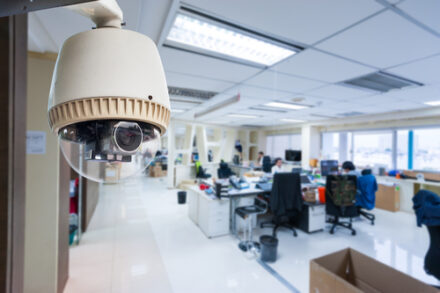
Employee monitoring; an employer’s guide
12th January 2023 by Alana Penkethman
Recent advances in technology mean that there are now numerous ways to monitor employees, including via a webcam on staff computers or by checking browser histories, email content and phone records. Productivity-tracking software offers a raft of ways to assess how employees spend their working day. Employers can also keep tabs on their employees’ movements through the working day using CCTV, vehicle location tracking, dash cameras and devices, or access cards which track employees’ movements in the workplace.
‘Employers are spoilt for choice by the range of ways to monitor employees and their productivity,’ says Alana Penkethman, employment expert at Laceys Solicitors, Bournemouth. ‘However, just because these forms of monitoring are readily available does not mean that using them is risk free.’
Alana runs through the pros and cons and explains the numerous legal and policy considerations for employers.
Benefits of employee monitoring
Monitoring is often justified in order to improve productivity, as a means of providing information for workflow analysis or as part of risk management.
Some software allows businesses to see where individuals or whole teams are taking longer than expected on particular tasks, and this information can be used to identify opportunities to improve processes, divert resources, or indicate where training is needed.
There are many ways in which employees can create liabilities for their employer, such as poor customer service, and most of us are familiar with the recorded message warning that a call may be ‘recorded for training purposes’. Other risks include unauthorised disclosure of confidential information, copyright infringement, employee negligence or carelessly handling personal data about other people in breach of data protection law.
If your employees know that they are or can be monitored, this can act as a deterrent to behaviour that could cause trouble. Records produced through employee monitoring can provide crucial evidence in disciplinary investigations.
Employers are usually liable for the behaviour of the employee when they are at work or there is a sufficient connection to work. For instance, the Employment Appeal Tribunal in Moonsar v Fiveways Express Transport Ltd [2002], found that male employees looking at pornography at work in the same room as a female colleague was sex discrimination.
Drawbacks to employee monitoring
Some employers prefer to use little or no employee monitoring, citing that it leads to an erosion of trust by failing to ‘treat employees like grown-ups’.
In some cases, employees may experience increased work-related stress from feeling that someone is constantly looking over their shoulder. Employers worry that monitoring may have an impact on employees’ health and wellbeing, particularly for those who are already experiencing poor mental health, as well as being damaging to recruitment and retention.
There are several legal frameworks which need to be considered if you intend to introduce employee monitoring:
- Human rights – Depending on the facts, human rights can be engaged as employees can have a reasonable expectation of privacy at work. The European Court of Human Rights in Halford v UK [1997] found this was the case when a senior police officer’s phone was tapped by her employer. She was not told that her phone calls could be monitored, and one phone line was designated for private use. A dismissal can be unfair if the employer cannot justify a breach of the employee’s right to privacy under the Human Rights Act.
- Data protection – Data protection law applies to monitoring employees. It determines what, how and why employers can monitor, as well as what employees need to know about the monitoring and who can deal with the information. The Information Commissioner’s Office’s Employment Practices Code and supplementary guidance give guidance on monitoring at work. It was created under the old Data Protection Act but remains valid under the GDPR. Complying with the GDPR involves careful consideration of your aims and weighing these up against the interference with the employees’ privacy. We can help you with this balancing act, as well as ensuring your processes and privacy notices are GDPR-compliant. Data protection law also applies to surveillance. The ICO has published guidance on video surveillance.
- Investigatory powers regulations – Monitoring phone calls and checking emails fall under the Investigatory Powers (Interception by Businesses etc. for Monitoring and Record-Keeping Purposes) Regulations 2018. This allows employers to intercept calls and communications through work phones and IT systems, that would otherwise be unlawful, provided the employer meets the relevant conditions. We can advise you on compliance with these.
- Constructive dismissal – Monitoring an employee’s activities, particularly where this is covert or disproportionately intrusive can breach the implied duty of trust and confidence. This allows the employee to resign and claim constructive unfair dismissal.
- Discrimination – Finally, employers should take care to ensure that any monitoring is done consistently, or any treating of certain employees differently is justified. Where an employee considers they are being unfairly targeted and this relates to a protected characteristic such as gender or race, they can bring a claim for discrimination. When monitoring disabled employees, employers should consider whether a lighter-touch approach or more flexible action is necessary as a reasonable adjustment.
- Covert monitoring – Covert monitoring or covert CCTV surveillance will only be lawful in exceptional circumstances, where a less-intrusive approach is not appropriate and where criminal activity or similarly serious activity is suspected, for example shop workers stealing from the shop. It must only be for a limited period of time and as few people as necessary should see the footage. Surveillance in a location, such as a toilet, where employees have a high expectation of privacy, is unlikely to ever be lawful.
Policy considerations
A cornerstone of lawful monitoring is to ensure that employees are made aware of the monitoring, the extent of the monitoring and how the information will be used. This should be clearly set out in relevant policies, particularly on internet and email use. We can advise you on the contents of the policy, ensuring employees are aware of it and effectively implementing it.
How we can help
We can help you safely implement employee monitoring to ensure that these important tools work for your business. For further information, please contact Alana on 01202 377 872 or email a.penkethman@laceyssolicitors.co.uk.
This article is for general information only and does not constitute legal or professional advice. Please note that the law may have changed since this article was published.



